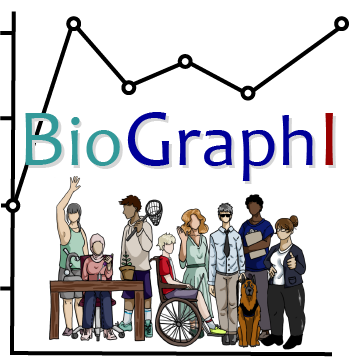BioGraphI - Biologists and Graph Interpretation: Professional development for an online curriculum to foster data literacy and value diverse identities (RCN-UBE Introduction)
Author(s): Suann Yang1, Rachel Pigg2
1. State University of New York College at Geneseo 2. University of Louisville
710 total view(s), 89 download(s)
Description
Biologists and Graph Interpretation (BioGraphI) is a supportive community of faculty and future faculty who gather to create and disseminate open educational resources called BioGraphI modules. BioGraphI modules address data literacy while fostering diversity in undergraduate biology classrooms. They are lessons about graph and data interpretation, featuring the scientific contributions of biologists who are members of historically excluded groups (HEGs). They include video interviews with these biologists, allowing students to hear directly from HEGs about their discoveries.
Problem: Interventions, such as BioGraphI modules, that highlight the work of counterstereotypical biologists can improve persistence and achievement for HEGs in biology. Integrating quantitative concepts into biology courses can also affect student persistence in undergraduate biology programs. Yet, faculty commonly perceive barriers to implementing evidence-based inclusive teaching practices and incorporating quantitative skills, such as data literacy. Identified barriers include a lack of professional development (PD) and lack of community support.
Activities: To address these barriers, this project provides multiple PD opportunities within a supportive network of faculty and future faculty, as they generate, disseminate, and train others to use BioGraphI modules. The network is a mechanism of change for inclusion in biology and improving data literacy. Faculty will gain increased recognition of diverse perspectives in biology and increased confidence in their ability to support a diverse student body. All faculty and future faculty are welcome to join our network. Participants so far represent a variety of institution types and include graduate students, postdocs, and faculty from diverse ranks and position types.
Online Faculty Mentoring Networks (FMNs): During this semester-long professional development opportunity, participants learn how to prepare and implement their own BioGraphI modules in their courses. Together with faculty colleagues from other institutions, they gain experience with DEI topics, backward design, Universal Design for Learning, interviewing, and more. At the end of the FMN, they publish their new module on the QUBES Hub and have made lasting connections with like-minded faculty.
Conference Workshops: In these workshops, participants experience a sample BioGraphI module and are guided through adopting one of our modules for their curricula. Online
Network Events: Network events include webinars, happy hours, and other online activities, where faculty can meet current and former FMN participants, workshop attendees, and other members of the BioGraphI network. Network events provide faculty with opportunities to exchange experiences with others who have created and/or adapted BioGraphI modules in their subject area and develop new collaborations.
Ways to learn more:
- An Overview of the Biologists and Graph Interpretation Project (Poster):
- Yang, S., Pigg, R. (2022). An Overview of the Biologists and Graph Interpretation Project. BioQUEST/QUBES Support Community for Partner Projects, QUBES Educational Resources. doi:10.25334/ZAWN-5M02
- BioGraphI QUBES page
- BioGraphI modules
Ways to get involved:
- Check out how to join the group and the different ways to participate.
- Visit the Spring 2023 BioGraphI Faculty Mentoring Network (FMN) group page.
If you are interested in learning more and participating please join this group or email Suann Yang and Rachel Pigg.
Cite this work
Researchers should cite this work as follows:
- Yang, S., Pigg, R. M. (2023). BioGraphI - Biologists and Graph Interpretation: Professional development for an online curriculum to foster data literacy and value diverse identities (RCN-UBE Introduction). RCN-UBE Community, QUBES Educational Resources. doi:10.25334/RZF7-HD17


 RCN-UBE #2120679
RCN-UBE #2120679